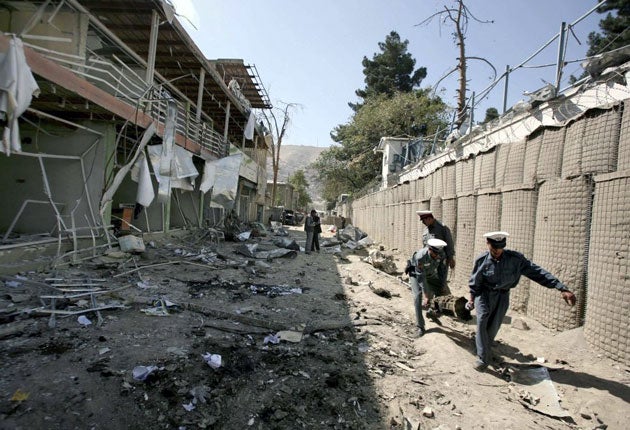Taliban bomber hits Indian embassy
Afghan suicide attack is set to renew tensions between Delhi and Islamabad

At least a dozen people were killed and scores more injured when a powerful car bomb was detonated outside India's embassy in Kabul yesterday – raising further questions about the ability to control rising militant violent inside Afghanistan.
Officials said that the blast killed 11 civilians and one Afghan police officer and was similar in strength to an attack on the same embassy last year that left dozens dead. On that occasion, the US said that they believed elements within Pakistan's ISI intelligence community had helped militants to carry out the attack.
Yesterday's bombing came a day after the eighth anniversary of the start of the war in Afghanistan and as the US President, Barack Obama, ponders whether to heed the requests of his military commanders and dispatch additional troops to the conflict.
The attack, for which the Taliban claimed responsibility, will also draw attention to the large and expanding Indian presence in Afghanistan, something that unsettles and unnerves Pakistan, which has traditionally considered the country its backyard. India recently completed a 125-mile electricity line that has brought much-needed power to Kabul.
Officials in Delhi said that they had little doubt that the embassy had been the target of the attack. "The suicide bomber came up to the outer perimeter wall of the embassy in a car loaded with explosives," the Foreign Secretary, Nirupama Rao, said.
US and Afghan security sources said that they were analysing telephone intercepts regarding the bomb. An Afghan official claimed that there was evidence suggesting that the attackers had links to Pakistan and claimed that information would be released over the next few days showing that some of the planning had taken place across the Pakistani border.
A 21-year-old man called Najibullah told the Associated Press that he had just opened his shop when the explosion knocked him unconscious: "There was dust everywhere. People were shouting. You couldn't see their faces because there was so much dust."
The carnage will add to the mutual distrust and suspicion that marks the relationship between Indian and Pakistan. After last year's attack on the diplomatic compound, CIA officials flew to Islamabad with what they said was proof that "rogue elements" within Pakistan's ISI intelligence agency had helped the militants responsible.
India and Pakistan have been arch adversaries for influence in Afghanistan since September 11.
Pakistan considers the country a launch-pad for influence in central Asia. Elements within its intelligence establishment have maintained links with Taliban fighters inside Pakistan who carry out cross-border attacks.
Meanwhile, India has sought strategic leverage though aid and infrastructure projects worth about $1.2bn (£750m). Pakistan accuses India of using such projects as cover for intelligence-gathering activities.
"Pakistan does not want to be trapped between a hostile Afghanistan [with Indian backing] and a hostile India," said Professor Shaun Gregory, the director of the Pakistan security research unit at the University of Bradford. "The presence of India also denies Pakistan the chance to use Afghanistan as its strategic space. The Indian presence is a real block to Pakistan's regional ambitions."
The top US commander in Afghanistan, General Stanley McChrystal recently warned the White House that Indian aid may be contributing to geopolitical turmoil.
In a report to Mr Obama, he said: "While Indian activities largely benefit the Afghan people, increasing Indian influence in Afghanistan is likely to exacerbate regional tensions and encourage Pakistani counter-measures in Afghanistan or India."
Subscribe to Independent Premium to bookmark this article
Want to bookmark your favourite articles and stories to read or reference later? Start your Independent Premium subscription today.

Join our commenting forum
Join thought-provoking conversations, follow other Independent readers and see their replies